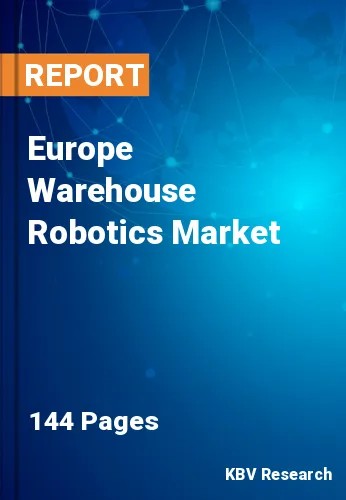The Europe Warehouse Robotics Market would witness market growth of 18.2% CAGR during the forecast period (2023-2029).
Robotics used in warehouses as a substitute for human labor is a combination of hardware and computerized technology. Robots are employed to push, pull, sort, store, and retrieve finished goods. Robotic technology adoption results in significant efficiency and transformation in the warehouse and industrial facilities. Improved cycle times, quicker material relocation, effective labor use, less contamination, more efficiency, reduced waste, compliance with regulatory standards, declining prices, better use of warehouse space, and increased employee safety are all benefits of warehouse robots.
With the right warehouse material handling techniques, warehouse robotics can efficiently store and move chilled and frozen meals. In order to provide best practices for cold storage, manufacturers are concentrating on choosing the appropriate machinery that can maintain the foodstuffs at a reasonable temperature throughout the handling process. Depalletizing, loading, unloading, palletizing, sorting, and storing tasks are all handled by different types of robots in cold storage facilities.
France ranked 16th on the International Federation of Robotics (IFR) report released in 2021; ahead of it were Germany, Spain, Denmark, Sweden, Austria, and Italy. In the UK, the proportion of smart manufacturing has increased over the past few years. The UK has witnessed an increase in robot usage since the Brexit vote. The UK government has also been encouraging the growth of the robotics and automation industry with incentives, including the "super deduction," that enables companies to claim a tax relief level of 130% for investments in machinery and plants. These actions will undoubtedly lead to an exponential expansion in the warehouse robotics market throughout Europe.
The Germany market dominated the Europe Warehouse Robotics Market by Country in 2022, and would continue to be a dominant market till 2029; thereby, achieving a market value of $919.8 million by 2029. The UK market is anticipated to grow a CAGR of 17.2% during (2023 - 2029). Additionally, The France market would exhibit a CAGR of 19.1% during (2023 - 2029).
Based on Function, the market is segmented into Pick & Place, Palletizing & De-palletizing, Packaging, and Transportation. Based on Application, the market is segmented into E-commerce, Automotive, Consumer Electronics, Healthcare, Food & Beverage and Others. Based on Product, the market is segmented into Mobile Robots, Articulated Robots, Cylindrical Robots, Scara & Parallel Robots and Cartesian Robots. Based on Payload Capacity, the market is segmented into Below 10 kg, 11 kg to 80 kg, 81 kg to 400 kg and 400 kg & Above. Based on Component, the market is segmented into Hardware, Software and Services. Based on countries, the market is segmented into Germany, UK, France, Russia, Spain, Italy, and Rest of Europe.
Free Valuable Insights: The Worldwide Warehouse Robotics Market is Projected to reach USD 13.9 Billion by 2029, at a CAGR of 19%
The market research report covers the analysis of key stake holders of the market. Key companies profiled in the report include ABB Ltd, Bastian Solutions, LLC (Toyota Advanced Logistics Group) (Toyota Industries Corporation), Daifuku Co., Limited, Dematic Group (Kion Group AG), Fetch Robotics, Inc. (Zebra Technologies Corporation), Honeywell International, Inc., Knapp AG, Kuka AG (Swisslog Holding AG), Omron Corporation and Yaskawa Electric Corporation.
By Function
By Application
By Product
By Payload Capacity
By Component
By Country
Our team of dedicated experts can provide you with attractive expansion opportunities for your business.

